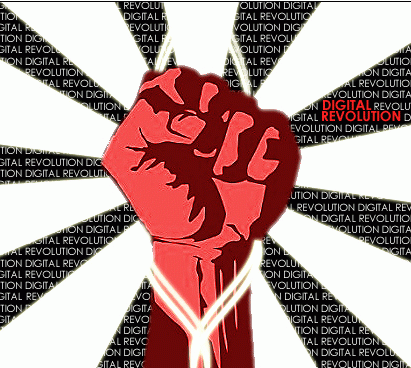Hide Ya Tweets, Hide Ya Hashtags, They Startin' Revolutions Out Here

This past week the world saw that in the battle of the people vs. the machine, the people prevailed. Acclaimed poet, Gil Scot Heron said the “Revolution Will Not Be Televised”; to a certain extent he was right. The revolution was digitized. Even though the seemingly insurmountable Mubarak machine was armed with a war chest of military muscle, political power, and billions of dollars; protesters were armed with hashtags, twitpics, and Facebook statuses. The online activism in the Egyptian Revolution underscored how the Internet can not only increase perceived self-efficacy, but also the ability for rank-and-file citizens to mobilize quickly.
“We Are All Khaled Saeed” is a Facebook group which formed in the aftermath of an Egyptian man who was beaten to death by local Egyptian law enforcement. The group attracted hundreds of thousands of members worldwide and played a prominent role in spreading and bringing attention to the growing discontent. As the protests began, Google executive Wael Ghonim revealed that he was the person behind the account. Another potent viral online contribution was made by Asmaa Mahfouz, a female activist who posted a video in which she challenged people to publicly protest.
httpv://www.youtube.com/watch?v=LxJK6SxGCAw
Yesterday, Ghonim tweeted, “Breaking the psychological barrier of fear is the tipping point of any revolution in any police driven regime led by a dictator”. We now live in an age where keystrokes can topple 30year regimes. The more we give people the tools and knowledge to become active participants in the global community, the louder their voices will be in civil society. Although we’ve recently seen Tunisians, Egyptians, and Algerians take charge of their countries through social media, we still must recognize that all over the world there is a conspicuous divide in access and knowledge of information technology. It is imperative that policy makers and common folk come together to find innovative ways to eradicate the digital divide (effective access to digital and information technology (IT) and those with very limited or no access at all). A society full of digital citizens is a strong society. Digital citizenship refers to a person that participates in society using a certain amount of information technology. A digital citizen is a person who has the skills and knowledge to interact with private and government organizations through means of “digital” tools such as computers or mobile phones, along with access to these devices. People characterizing themselves as digital citizens often use IT extensively, creating blogs, use social networking and other means of modern communication.

Yes, it is true that I believe digital citizenship is imperative to civic engagement and increasing social capital, however, I do not want to present a romanticized assessment of the Egyptian revolution. While it is fair to say that most folks in Egypt and the Western world are delighted that Mubarak decided to step down, there are still many questions that need to answered in the region. Can a military organization successfully negotiate a transition to democracy? Can a country the size of Egypt be governed by what is essentially a committee? How will the next regime deal with the fact that 35 million Egyptians make less than $2 a day? We all say that we want Democracy, but what does it mean in the broader context? Moreover, what are the limitations of Democracy and it’s implications on race, socio-economic status, gender, and sexuality. Egypt is just one example, of how the #digitalrevolution is changing the way we view the world, but we also must bear in mind that there is still work to be done.
“If you don’t become an actor you’ll never be a factor”- Lupe Fiasco
httpv://www.youtube.com/watch?v=PFIu9NwE0-s&playnext=1&list=PL7D55F113BF3B404E

